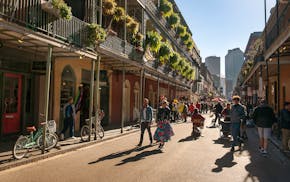On first glance it might seem that Minnesota authors William Kent Krueger and Mindy Mejia's latest novels have little in common.
Krueger's "Spirit Crossing" is a stellar example of eco-literature, where place transcends plot to explore social and environmental themes. On the other hand, Mejia's "A World of Hurt" is muscular Midwest noir: cynical, violent, existential. But take a second glance. Both novels have complex characters struggling with tough emotional dilemmas, both tell really good stories and, if you ask me, this makes both the best of the best.
"Spirit Crossing" is the 20th book (hip! hip!) in Krueger's beloved Cork O'Connor series. Cork's mantra has always been that "if you pull one thread" in an investigation, "it sometimes loosens others."
The first thread unravels on its own. While searching for a good blueberry patch, Cork's grandson, Waaboo, has a vision. Like others in his Ojibwe family, Waaboo can see spirits. His vision leads to a buried body beneath the berries. Working together, Cork and his son-in-law, Daniel, tug some more. Eventually, their investigation untangles the knotted strands of a missing white girl and a missing Ojibwe girl, and the terrible reality that missing white girls get the headlines more than the hundreds of missing indigenous ones.
The place of the title, Spirit Crossing, is "contested land," the site where the Iron Lake Ojibwe have been fighting to secure their "rightful dominion" for decades. Now, it's a place of protest as they fight to prevent an oil pipeline from destroying the land.
Spirit Crossing also is the "path of souls," where spirits move toward the divine. But, for me — despite the presence of Henry Meloux, an Ojibwe Mide healer and the family's spiritual adviser — Annie, Cork's queer daughter, is the emotional heart of this novel. Annie has returned to Gooseberry Lane to celebrate her brother Stephen's marriage, carrying baggage that threads beautifully through the story.
Mejia's latest thriller, "A World of Hurt" sees alienated Iowa police detective Max Summerlin and DEA informant and ex-drug-trafficker Kara Johnson elbow deep in it. Again. This novel opens a year after the events in Mejia's addictive "To Catch A Storm," where they brought down a massive drug cartel operating throughout the Midwest. This time, it's way personal. Celina, Kara's girlfriend, her "air," her "reason," was killed in the bust. Kara's out to protect her lover's legacy.
Kara has unsuccessfully tried to "fill the empty spaces" after Celina's death "with drinking, with drawing, with vengeance." Not working. With promises of a clean(ish) slate if she becomes the "bait to trap the enforcer" taking out loose ends from the drug bust, Kara lets the chaos back into her life.
Set mostly in northeastern Iowa, the novel jumps between Kara's point of view and Max's. I was all in for Kara's. She's one of the most intriguing, broken, bad-ass characters I've read recently.
She drives the novel's crazy-intense plot with her questionable choices and queer-focused, feminist point of view: She calls out the male gaze when she sees it. She scoffs at men "spouting credentials like they were whipping them out to measure." She doesn't know "where the boundary is between healthy and hurt, between living and dying."
That's another thing the books have in common. Cork O'Connor may be "bent by the weight of too many years filled with too many worries," and Kara Johnson may be "long past [her] expiration date," but I hope both will be back.
Carole E. Barrowman is a writer and teacher.
Spirit Crossing
By: William Kent Krueger.
Publisher: Atria, 335 pages, $28.99.
A World of Hurt
By: Mindy Mejia.
Publisher: Atlantic Monthly Press, 337 pages, $27.

For 'Legally Blonde' star, 'being underestimated is her secret superpower'

Restaurant openings and closings in the Twin Cities

24 terrific books for the beach, cabin or lawn chair you'll want to read this summer

Worth It podcast: Prince week, a giant pencil, pool parties and women's sports



